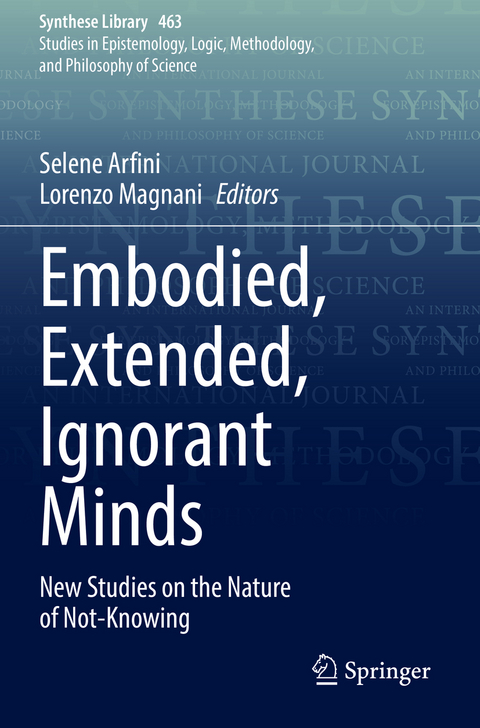
Embodied, Extended, Ignorant Minds
Springer International Publishing (Verlag)
978-3-031-01924-1 (ISBN)
lt;b> Selene Arfini is a postdoctoral researcher at the University of Pavia, currently working on a project entitled "Ignorance in the perspective of the ecology of cognition: cognitive niches, the extended mind, and ignorance-based reasoning". Her current work involves the foundation of a cognitively oriented epistemology of ignorance, with reference to the extended mind theory, cognitive niches construction studies, and a naturalized perspective on logic. She has established herself as an authority on the topic of ignorance in relation to cognition, recently publishing Ignorant Cognition - A Philosophical Investigation of the Cognitive Features of Not-Knowing, Springer (2019) and editing a Synthese Topical Collection on "Knowing the Unknown: Philosophical Perspective on Ignorance" (2020).
Lorenzo Magnani is a philosopher, epistemologist, and cognitive scientist, professor at the University of Pavia, Italy, and director of its Computational Philosophy Laboratory. His book Abduction, Reason, and Science (2001) has become a well-respected work in the field of research on human cognition. The book Morality in a Technological World has been published by Cambridge University Press (2007). Abductive Cognition has been published by Springer in 2009 together with the more recent Understanding Violence, 2011. A new monograph that completes his rich studies on abductive cognition has come out in 2017, The Abductive Structure of Scientific Creativity, together with the Springer Handbook of Model-Based Science (edited with Tommaso Bertolotti). He is the co-editor of the Special Issue for Synthese entitled Knowing the Unknown: Philosophical Perspectives on Ignorance.
Chapter 1. Introduction: Externalist Perspectives on Ignorance and Cognition (Selene Arfini and Lorenzo Magnani).- Chapter 2. Relational Ignorance (Samantha Copeland).- Chapter 3. Creative Ignorance (Wendy Ross).- Chapter 4. Extended Ignorance (Duncan Pritchard).- Chapter 5. Mindshaping, Racist Habits, and White Ignorance (Michelle Maiese).- Chapter 6. Ignorance and (Im)Possibility (Vlad Glaveanu).- Chapter 7. Mind Invasion through Cognitive Integration: Facebook and the Exploita-tion of Users' Ignorance (Giacomo Figà-Talamanca and Elisabeth Hunting).- Chapter 8. Institutions as Cognitive Niches: A Dynamics of Knowledge and Ignorance (Konrad Werner).- Chapter 9. How Do We Think about the Unknown? The Self-Awareness of Ignorance as a Tool for Managing the Anguish of Not Knowing (Alger Sans Pinillos and Lorenzo Magnani).- Chapter 10. How Do We Become Ignorant? Affording Ignorance Through Epistemic Actions (Selene Arfini).
| Erscheinungsdatum | 26.05.2023 |
|---|---|
| Reihe/Serie | Synthese Library |
| Zusatzinfo | V, 230 p. 1 illus. |
| Verlagsort | Cham |
| Sprache | englisch |
| Maße | 155 x 235 mm |
| Gewicht | 367 g |
| Themenwelt | Geisteswissenschaften ► Philosophie |
| Schlagworte | Cognitive Niches • distributed cognition • embodied cognition • epistemic parasitism • Extended Mind Theory • ignorance and cognition • Ignorance studies • managing ignorance • Relational ignorance |
| ISBN-10 | 3-031-01924-5 / 3031019245 |
| ISBN-13 | 978-3-031-01924-1 / 9783031019241 |
| Zustand | Neuware |
| Haben Sie eine Frage zum Produkt? |
aus dem Bereich


